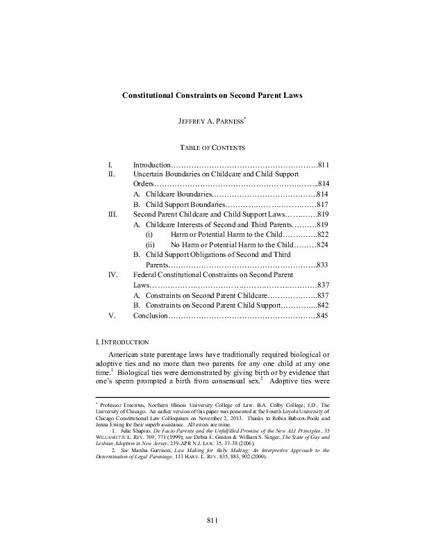
American state parentage laws have traditionally required biological or adoptive ties and no more than two parents for any one child at any one time. Biological ties were demonstrated by giving birth or sperm. Adoptive ties were established by completion of formal procedures by those desiring to parent, where prospective adopters were assessed for parental worthiness by the state. While the two parent policy largely continues, increasingly for children with only one parent there are recognized long after birth second parents with no biological or formal adoptive ties and with no rights under a valid child creation pact predating birth (i.e., assisted reproduction, with or without a surrogate). At times a woman or a man becomes a second parent under law, along with the birth mother, because natural ties are presumed, though sometimes impossible, as when a second woman holds out a child as her own. At times a man or a woman becomes a second parent via de facto parenthood where there is no state assessment; little respect for the actual wishes of the existing parent about second parenthood; and, at best, notice to the state only after the fact. Where a child has one biological or adoptive parent, the recognition of a second parent with no biological, formal adoptive, or child creation pact ties, but with standing to seek childcare, necessarily impacts the childcare prerogatives of the existing parent. As these prerogatives are constitutionally protected, the second parent cannot be state-recognized over the biological/adoptive/assisted reproduction parent’s objection without a showing going beyond the child’s best interests. First parent constraints on second parent designations are guided by the “superior rights” doctrine. The federal constitutional demands regarding state use of this doctrine are unclear, however. Where a child has one biological or adoptive or assisted reproduction parent, the recognition of a second parent with no biological, formal adoptive, or child creation pact ties, who can be subject to a child support order implicates the federal constitutional due process interests of the second parent. These interests include both procedural and substantive protections, including at least a rational public policy. This paper first examines current American second parent laws on childcare and child support. As to each it finds significant intrastate variations. The paper concludes by exploring the federal constitutional constraints on second parent childcare and child support.